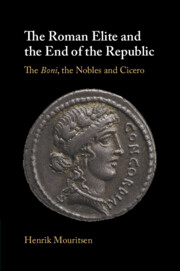Book contents
- The Roman Elite and the End of the Republic
- The Roman Elite and the End of the Republic
- Copyright page
- Contents
- Acknowledgements
- Introduction
- Part I The Boni in the Late Republic
- Part II Property and Politics
- Chapter 6 Wealth and Morality Revisited
- Chapter 7 Boni
- Chapter 8 Boni and Improbi
- Chapter 9 Otium and Tranquillitas
- Chapter 10 Vita et Bona
- Chapter 11 The Road to Perdition
- Chapter 12 ‘Egentes Sumptuosi Nobiles’
- Part III The Boni and the End of the Republic
- Appendices
- Bibliography
- Index
Chapter 11 - The Road to Perdition
Egestas and Aes Alienum
from Part II - Property and Politics
Published online by Cambridge University Press: 15 December 2022
- The Roman Elite and the End of the Republic
- The Roman Elite and the End of the Republic
- Copyright page
- Contents
- Acknowledgements
- Introduction
- Part I The Boni in the Late Republic
- Part II Property and Politics
- Chapter 6 Wealth and Morality Revisited
- Chapter 7 Boni
- Chapter 8 Boni and Improbi
- Chapter 9 Otium and Tranquillitas
- Chapter 10 Vita et Bona
- Chapter 11 The Road to Perdition
- Chapter 12 ‘Egentes Sumptuosi Nobiles’
- Part III The Boni and the End of the Republic
- Appendices
- Bibliography
- Index
Summary
The basic distinction in Roman politics between boni and improbi carried a distinctly material aspect; for despite its moralising nature, it remained firmly rooted in the socio-economic realities of late republican society. Improbitas was closely associated with cupiditas and egestas – ‘greed’ and ‘poverty’, which became standard charges against political opponents; indeed, almost all protagonists appear to have been accused of financial improprieties of some form or other.1 The disruptive actions of improbi were routinely presented as property-related – be it their own dwindling resources or the tempting estates of the viri boni. The result was two socio-political archetypes, neatly summed up in Cicero’s description of Naevius’ associate in the Pro Quinctio, who was not a ‘hominem egentem … improbum’, but an ‘eques Romanus locuples, sui negotii bene gerens’, a ‘rich Roman eques, who conducted his business well’, 62.
- Type
- Chapter
- Information
- The Roman Elite and the End of the RepublicThe <i>Boni</i>, the Nobles and Cicero, pp. 163 - 176Publisher: Cambridge University PressPrint publication year: 2022

